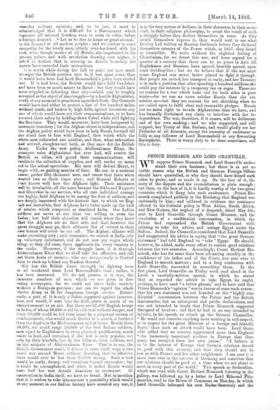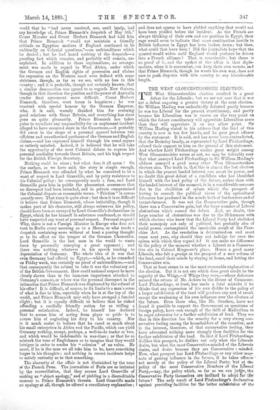PRINCE BISMARCK AND LORD GRANVILLE.
WE suppose Prince Bismarck and Lord Granville understand their own business ; but there is as yet no visible reason why the British and German Foreign Offices should have quarrelled, or why they should have kissed each other by proxy, and so made it up. On the face of it, the story of the dispute and the reconciliation is plain enough ; but then, on the face of it, it is hardly worthy of the two great countries which it flung into such excitement. Prince Bismarck complained publicly in the Reichstag that England was unfriendly to him ; and adduced in evidence the resistance offered to his Colonial policy in West Africa, South Africa, and New Guinea, the neglect of a despatch, dated May 5th, sent to Lord Granville through Count Minster, and the revelation of a confidential conversation, in which the Prince had reproached the British Government with refusing to take his advice, and occupy Egypt under the Sultan. Indeed, the Chancellor considered that Lord Granville had exaggerated his advice in saying that " the great German statesman" had told England to "Take " Egypt. He should, however, he added, make every effort to restore good relations between the two countries. Accordingly, Count Herbert Bismarck, who has for some time been advancing steadily in the confidence of his father and of the Court, was sent over to England to smooth matters ; and in a long conference with Lord Granville, succeeded in smoothing them. In the first place, Lord Granville on Friday week read aloud in the Lords a carefully-written speech, in which he stated that as regarded the advice to take Egypt, he ought, perhaps, to have used "a better phrase," and to have said that Prince Bismarck's " opinion" was in favour of some such course ; that his own statement was not founded on the "highly confidential " conversation between the Prince and the British Ambassador, but on subsequent and public declarations, and was not intended to imply that Prince Bismarck suggested disregard of treaties ; and that he had in no way intended to initiate, in his speech, an attack ga the German Chancellor. " He could not conceive anything more wanting in self-respect, or in respect for the great Minister of a foreign and friendly State," than such an attack would have been. Lord Granville added that no country appreciated more than England " the immensely important position in Europe that Germany has occupied since her own union." " I believe it to be the interest of Europe that German relations should be good with this country, and that they should not be less so with France and her other neighbours. I am sure it is more than ever in the interest of Germany and ourselves that our relations should be good at a time when we are about to meet in every part of the world." This speech or declaration, which was read with Count Herbert Bismarck listening in the gallery, was followed up by a letter to Lord Edmond Fitzmanrice, read in the House of Commons on Mondsy, is which Lord Granville informed his own Under-Secretary and the world that he " had never received, nor, until lately, had any knowledge of, Prince Bismarck's despatch of May 5th." Count Minster and Count Herbert Bismarck had told him that Prince Bismarck " could not maintain a friendly attitude on Egyptian matters if England continued to be unfriendly on Colonial questions,"—an unfriendliness which he denied ; but he had heard nothing of the despatch—a puzzling fact which remains, and probably will remain, unexplained. In addition to these explanations, an arrangement was made in regard to West Africa, under which the German and English rights of possession and claims for expansion on the Western coast were defined with some strictness, though, as far as we see, with no loss to this country ; and it is probable, though not certainly known, that a similar demarcation was agreed to as regards New Guinea, though in that direction the position and the power of Australia render final agreement ' more difficult. Count Herbert Bismarck, therefore, went home in happiness ; he was received with special honour by the German Emperor, who, it is said, warmly thanked him for restoring good relations with Great Britain, and everything has since gone on quite pleasantly. Prince Bismarck has taken pains to repudiate any responsibility for an unpleasant incident alleged to have occurred since in the Cameroons,—it probably did occur in the shape of a personal quarrel between two officious and unauthorised partisans of the German and English claims,—and has expressed himself through his usual organs as entirely satisfied. Indeed, it is believed that he will take the opportunity of the next Colonial debate to express his personal cordiality towards Great Britain, and his high respect for the British Foreign Secretary.
Nothing could be nicer ; but what does it all mean ? On the surface, as we have said, the story is simple enough. Prince Bismarck was offended by what he conceived to be a want of respect in Lord Granville, and by petty resistance to his Colonial policy ; he consequently made a fuss, and Lord Granville gave him in public the pleasantest assurances that no disrespect had been intended, and in private compromised the Colonial dispute on reasonable terms. " Friction " is consequently over. That story is quite clear ; but then it is so difficult to believe that Prince Bismarck, whose irritability, though it makes part of his character, still always subserves his policy, should have been so annoyed by Lord Granville's declarations on Egypt, which he has himself in substance confirmed, or should have suspected any want of personal respect. Personal respect ? Why, there is not a Foreign Minister in Europe who does not turn to Berlin every morning as to a Mecca, or who reads a despatch containing news without at least a passing thought as to its effect on the temper of the German Chancellor. Lord Granville is the last man in the world to waste force by personally annoying a great opponent ; and there was nothing whatever in his speech tending to depreciation of Germany. The whole idea of it was that even Germany had offered us Egypt,—which, as he remarked on Friday week, was certainly no proof of unfriendliness,—and that consequently the refusal to take it was the voluntary act of the British Government. How could national respect be more clearly shown than in the immense importance attached to Germany's consent, or where was the personal disrespect in the intimation that Prince Bismarck was displeased by the refusal of his offer ? It is difficult, of course, to fix limits to a man's sense of what is due to him, especially when he is at the top of the world, and Prince Bismarck may only have avenged a fancied slight ; but it is equally difficult to believe that he risked offending a cordially friendly nation for so trifling a personal satisfaction. Indeed, he himself has declared that to accuse him of acting from pique or pride is to accuse him of neglecting his duty to his country. Nor is it much easier to believe that he cared so much about his small enterprises in Africa and the Pacific, which can yield Germany nothing, except, perhaps, a well-to-do trader or two, and which would be indefensible in war-time ; or that he so mistook the tone of Englishmen as to imagine that they would intrigue in order to render his " colonies ' of no value. He must, if he is the man we all take him to be, have something larger in his thoughts ; and nothing in recent incidents helps to satisfy curiosity as to that something.
The obscurity of the affair is not diminished by the tone of the French Press. The journalists of Paris are so irritated by the reconciliation, that they accuse Lord Granville of making an " abject apology," and of yielding in a discreditable manner to Prince Bismarck's threats. Lord Granville made no apology at all, though he offered a conciliatory explanation ; and does not appear to have yielded anything that would not have been yielded before the incident. As the French are always thinking of their own and our position in Egypt, their rage would seem to indicate that some combination hostile to British influence in Egypt has been broken down ; but then, what could that have been ? Did the journalists hope that the quarrel would widen until England would perforce be driven into a French alliance ? That is conceivable ; but there ie no proof of it, and the upshot of the affair is that diplomatists, when it is convenient, can keep their own secrete, and that Prince Bismarck, though he wants his own way, does not care to push disputes with this country to any irretrievable length.



































 Previous page
Previous page